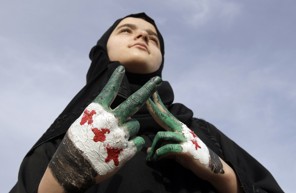 A Syrian foreign ministry spokesman, who was the most public face of Bashar al-Assad’s government as it battled a 20-month-old uprising, has defected and fled the country, a diplomat in the region said on Monday.
A Syrian foreign ministry spokesman, who was the most public face of Bashar al-Assad’s government as it battled a 20-month-old uprising, has defected and fled the country, a diplomat in the region said on Monday.
Jihad al-Makdissi, who is in his 40s, previously worked at the Syrian embassy in London and returned to Damascus a year ago to serve as spokesman for the ministry, defending the government’s crackdown on the revolt against Assad’s rule.
He had little influence in a system largely run by the security apparatus and the military. But Assad’s opponents will see the loss of such a high profile figure, if confirmed, as further evidence of a system crumbling from within.
Rebel forces have made advances in recent weeks, seizing several military bases including some outside the capital Damascus.
“He defected. All I can say is that he is out of Syria,” the diplomatic source, who did not want to be named, told Reuters.
Lebanon’s al-Manar Television, citing government sources, said Makdissi was sacked for making statements that did not reflect the government’s position.
Makdissi belongs to Syria’s Christian minority, which has largely stood behind Assad. He worked with the foreign ministry for 10 years and speaks fluent English, a rarity in a state apparatus shaped by the ruling Baath Party’s anti-Western ideology.
He was rarely seen in the media in recent weeks. His mobile telephone was switched off and there was no immediate comment in Syrian state media. The pan-Arab news channel Al Arabiya said Makdissi had left Beirut and was on his way to London, where he was expected to remain.
DAMASCUS BATTLES
The army has been striking back and appears to have focused most of its energy on Damascus, where rebels have been planning to push into the capital from the surrounding suburbs.
The military has been trying to seal off the capital, using heavy bombardment and air raids to try to drive rebels back. Over 56 people were killed around Damascus alone on Sunday, with 200 dead across the country.
The city itself has not been free of unrest. Rebel-held southern districts have been bombarded heavily, activists say. The Syrian Observatory for Human Rights reported fierce clashes around the Tishreen military hospital in the northern Barzeh district and a car bomb in the southern area of Tadamon.
Neither side appears to have the upper hand in the fighting around Damascus. A previous attempt by rebels last July to hold ground in the city was crushed, but the fighters fell back into the suburbs and nearby countryside.
Clashes and tensions also remain high around Damascus International Airport and along the airport highway, which has become an on-and-off battleground that forced foreign airlines to suspend flights to Damascus since Thursday evening.
EgyptAir, which attempted resume flights on Monday after a three-day halt, had to call back a plane headed to Damascus due to the “bad security situation” around the airport, an official from the airline said.
The conflict has grown increasingly bloody in recent months, particularly as rebels began to contest Assad’s power around the capital as well as in Aleppo, Syria’s largest city. More than 40,000 people have died in the conflict, with hundreds more killed each week.
The United Nations said on Monday it was withdrawing “all non-essential international staff” from Syria because of deteriorating security, and was restricting remaining staff to Damascus. It said more armored vehicles were needed following attacks on humanitarian aid convoys sometimes caught in the crossfire.
CHEMICAL WEAPONS
Rebels have begun to advance more quickly after months of slow sieges to cut off army routes and supplies. In the past few weeks, they seized several military bases, and they are now using anti-aircraft weapons to attack the military helicopters and fighter jets that bombarded their positions with impunity until now.
Media reports citing European and U.S. officials said Syria’s chemical weapons had been moved and could be prepared for use in response – long a fear raised by the opposition.
Syria said on Monday it would not use chemical weapons against its own people after the U.S. Secretary of State Hillary Clinton warned that Washington would take action against any such escalation.
“Syria has stressed repeatedly that it will not use these types of weapons, if they were available, under any circumstances against its people,” the foreign ministry said.
Reuters

Leave a Reply
You must be logged in to post a comment.